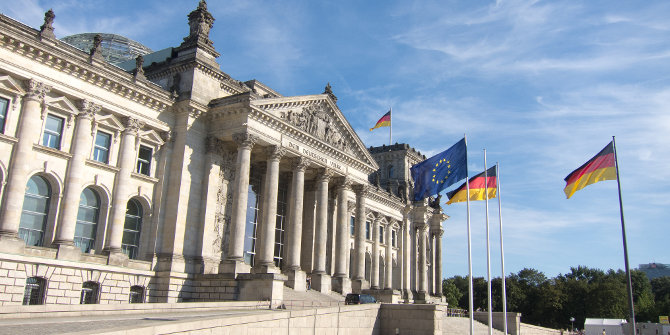 What might a UK exit from the European Union mean for Europe’s future? So far, the Brexit debate has been largely concentrated within these islands and few other EU states have focussed on it as a likely or imminent prospect. But, as the rest of Europe wakes up to the evidence of the opinion polls that the British may well vote in the coming months to leave, there are the stirrings of serious alarm, writes Kevin Featherstone. He suggests that the best strategy for Britain’s partners would be to wait for London to present its proposals for a future relationship. Especially since the domestic ramification of a Brexit for the rest of Europe will be a boost to the anti-European political extremes and populists. Furthermore, a Brexit will threaten the global role of both the UK and the EU, and ultimately it will be a will be a ‘lose-lose’ for both sides.
What might a UK exit from the European Union mean for Europe’s future? So far, the Brexit debate has been largely concentrated within these islands and few other EU states have focussed on it as a likely or imminent prospect. But, as the rest of Europe wakes up to the evidence of the opinion polls that the British may well vote in the coming months to leave, there are the stirrings of serious alarm, writes Kevin Featherstone. He suggests that the best strategy for Britain’s partners would be to wait for London to present its proposals for a future relationship. Especially since the domestic ramification of a Brexit for the rest of Europe will be a boost to the anti-European political extremes and populists. Furthermore, a Brexit will threaten the global role of both the UK and the EU, and ultimately it will be a will be a ‘lose-lose’ for both sides.
A recent hearing of the ‘LSE Commission on Britain’s Future in Europe’ that addressed this question posed a number of fears over the implications. Politically, the immediate impact would be shock and uncertainty over how a Brexit could be managed. The best strategy for Britain’s partners would be to wait for London to present its proposals for a future relationship – the 27 are unlikely to be able to agree a first offer anyway. A deal would be complex to sort out and our partners would wish to hear what the British government led by Cameron or not, actually asks for. Predicting the course of the negotiations will be impossible and they’re unlikely to be able to be concluded within the two years’ stipulation of the Treaties.
A domestic ramification for Britain’s partners will be a boost to the political extremes and populists who advocate a block on Europe’s development or even their own exit. The presidential prospects of Marine Le Pen in France will look brighter and the voices of the far right in places like Hungary, the Netherlands, Austria, Greece, and Poland will get louder.

A ‘no’ vote by the British will greatly extend the crises that the EU is already trying to manage. Geopolitically, a Brexit will weaken Europe’s ability to stand up to Putin’s aggression and the challenges of jihadism. The EU would lose a member that has one of its biggest military and diplomatic capacities, its main advocate of interventionism, and the strongest link with Washington. Brexit will threaten the global role of both the UK and the EU. Internally, a Brexit will rejuvenate fears of Germany hegemony, with France alone unable to be the counter-balance, with concerns revived in Europe’s east and south.
Economically, the Brexit negotiations will be highly asymmetrical, given their differences in trading strength, but both sides will have an interest in trying to reach a deal as soon as possible. The EU could well hold out for a tough deal, as a warning to others who might consider some kind of exit. The EU will lose a major net contributor to its budget and an important market for continental exporters. The prospect of restrictions on free movement between the UK and the rest of the EU is bound to have economic costs for both sides. The general uncertainty will discourage FDI into Britain.
Without Britain, the EU might become more inward-looking. The high-level meetings of the EU might see fewer dissenters. In the Council thanks to the decision-making with qualified majority voting, France will become more pivotal in a number of areas. Britain is a long-standing advocate of freer trade and meaningful structural reforms, but given that it is often in a minority with its ambitions in these areas, the EU’s overall macroeconomic policies are unlikely to show much change in basic principles.
Perhaps because they have been slow to react to the prospect of a Brexit, a ‘no’ vote will shake the EU suddenly and deeply. It will pile on the agony amidst the migration and debt crises and foster the general air of self-doubt. And, once things settle down, a Brexit will be a ‘lose-lose’ outcome for both sides.
The article gives the views of the author, and not the position of the LSE BrexitVote blog, nor of the London School of Economics and Political Science.
Kevin Featherstone is Eleftherios Venizelos Professor of Contemporary Greek Studies and Professor of European Politics and the Head of the LSE European Institute







How can it be a lose lose? At the bare minimum we will be £10 billion a year better off & the 90% of UK businesses that have no interaction outside of the UK & don’t want any will not have to implement 100% of the legislation that is thrown at them by people they didn’t elect & worse we can’t get rid of at election time.
The Euro-zone owns the EU.
Britain has no vote in the Euro-zone & joining the Euro-zone means “ever closer union” plus the acceptance of the Frankenstein currency.
So, Britain, if is stays in the EU it will always be outside of the Euro-zone, have no vote there & be presented at every turn with an already done deal with the Euro-zone voting as a bloc against Britain.
A Thatcher cabinet minister called the EU “A German racket”.
In any event, the Euro-zone owns the EU & that brutal fact must mean the end of British participation in the EU.
Leave!
Hi
What nonsense to suggest its a loose loose all round . I remember a time before we were in the E U . We had trade with the whole world . Even today Osbourne is in China he knows that the E U trade is not sufficient in volume to sustain Britain . How can he say today that the referendum is disruptive to our economic stability . He and his friends have started this process.